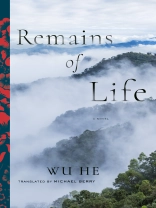On October 27, 1930, during a sports meet at Musha Elementary School on an aboriginal reservation in the mountains of Taiwan, a bloody uprising occurred unlike anything Japan had experienced in its colonial history. Before noon, the Atayal tribe had slain one hundred and thirty-four Japanese in a headhunting ritual. The Japanese responded with a militia of three thousand, heavy artillery, airplanes, and internationally banned poisonous gas, bringing the tribe to the brink of genocide.
Nearly seventy years later, Chen Guocheng, a writer known as Wu He, or ‘Dancing Crane, ‘ investigated the Musha Incident to search for any survivors and their descendants. Remains of Life, a milestone of Chinese experimental literature, is a fictionalized account of the writer’s experiences among the people who live their lives in the aftermath of this history. Written in a stream-of-consciousness style, it contains no paragraph breaks and only a handful of sentences. Shifting among observations about the people the author meets, philosophical musings, and fantastical leaps of imagination, Remains of Life is a powerful literary reckoning with one of the darkest chapters in Taiwan’s colonial history.
Daftar Isi
Introduction
Remains of Life
Afterword
Notes
Tentang Penulis
Wu He is a native of Tainan, Taiwan, and came to prominence in 1974 with the publication of his award-winning short story, ‘Peony Autumn.’ He spent much of the 1980s and 1990s in seclusion before returning to the literary world with a string of powerful and challenging books, including Digging for Bones (1995), The Sea at Seventeen (1997), Wu He Danshui (2001), Ghost and Goblin (2005), and Chaos and Confusion (2007), and has won nearly every major national literary award upon its publication in Taiwan.Michael Berry is professor of modern Chinese literature and film at the University of California, Los Angeles. He is the author of, among others, Speaking in Images: Interviews with Contemporary Chinese Filmmakers (2005) and A History of Pain: Trauma in Modern Chinese Literature and Film (2008), and the translator of several novels, including Wild Kids: Two Novels About Growing Up (2000), Nanjing 1937: A Love Story (2002), and, with Susan Chan Egan, The Song of Everlasting Sorrow: A Novel of Shanghai (2008), all from Columbia University Press.












